Vilnius University Faculty of Communication
| Vilnius University Faculty of Communication | |
|---|---|
| Vilniaus universiteto Komunikacijos fakultetas | |
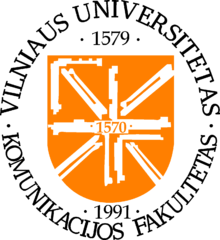 | |
| Established | 1991 |
| Dean | Andrius Vaišnys |
Academic staff | 80 (2013) |
| Students | 1255 (2013) |
| Undergraduates | 1000 (2013) |
| Postgraduates | 232 (2013) |
| 23 (2013) | |
| Location | Vilnius, Lithuania |
| Website | http://www.kf.vu.lt/en |
The Vilnius University Faculty of Communication is one of the faculties of Vilnius University. It provides education and training for communication and information specialists and organizes research in these scientific domains. Andrius Vaišnys became its head in 2007.
History

The Vilnius University Faculty of Communication was established on 18 June 1991, in response to the rapid development of information services and the increasing need for cohesive research in communication technology. The Vilnius University Council passed a resolution to establish the Faculty of Communication on the recommendation of the former Departments of Library Science, Information Systems, Book Science and Bibliography, Radio and Television Journalism and Print Journalism. This reorganization was initiated as part of the granting of legal status to the university by the Seimas of the Republic of Lithuania in 1990, shortly after the nation's restoration as an independent state.
In 1992, an Informatics study programme opened development opportunities for other specialities, such as business information management (1997) and publishing (2005). The winning of the TEMPUS project encouraged the creation of two Master’s programmes. In 1993, PhD programs opened. More than ten years later, Professors E. Macevičiūtė, A. Glosienė and O. Janonis joined the faculty after the successful completion of the habilitation procedure in 2004.[1]
The Faculty further enlarged and changed its organizational forms: during 2000-2001, several Departments became Institutes. In 2003, a separate International Centre of Knowledge Economy and Management was allowed to teach certain Master's programmes and conduct the habilitation procedure. In 2007, the Centre’s study programmes were restored to the Faculty of Communication. In 2009, these Master's programmes were updated and reintroduced.
Starting from 2010–2011, the Faculty introduced study programmes on international communication taught entirely in English and based on the ERASMUS Project European Master’s Studies in Professional Communication.
Mission and vision
The Faculty's mission is to provide training for information and communication technology, to conduct scientific research and to transmit the cultural identity of Lithuania.[2]
Divisions
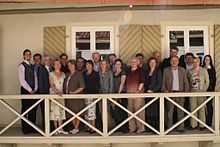
The Faculty of Communication consists of the following subdivisions:
- Institute of Library and Information Science
- Department of Information and Communication
- Institute of Book Science and Documentation
- Institute of Journalism
- Department of Museology
- Media Research Laboratory
- Creative Media Institute
Integrated information centre
The Faculty also operates one non-subject division – the Integrated Information Centre. This division was established in 1997, as a part of the TEMPUS project Information Management Programme for Lithuania. Its mission is as follows:
- To implement and maintain information technologies at the Faculty
- To develop and support internal communication tools
- To design and implement email conference technology
- To implement Faculty public relations
- To administer and update the Faculty website
- To officially represent the Faculty at fairs
- To assist in organizing Faculty events
- To collaborate in the development and implementation of Faculty projects[3]
Science
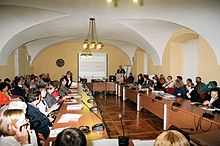
The staff of the Faculty employs 58 researchers – the largest team of communication and information scientists in Lithuania, with 6 PhDs who have been awarded the habilitation qualification or have passed the habilitation procedure, 38 other PhDs and 23 doctoral students.
The seven academic divisions of the Faculty have been engaged in fundamental and applied research of very broad scope, ranging from knowledge economy to Lithuanian heritage. Faculty scientists work in four areas:
- Information Management in Libraries, Archives and Museums
- Expression and Models of Information and Communication in the Knowledge Society
- Fundamental and Applied Documentary Research
- Research in Changes of Periodical Media and Source Study of Periodical Press
During 1991–2010, 45 candidates defended their PhD dissertations and national and international conferences were organized. Contacts with international organizations such as EUCLID, EUPRERA, FID, IFLA and SHARP were established. The Faculty annual international book science conference is of regional scientific importance. Researchers from various Lithuanian institutions significantly contribute to the traditional Readings of Vaclovas Biržiška, as well as to seminars and conferences organized by the Department of Information and Communication and the Institute of Journalism.
Between 1991 and 2008, the Faculty annually published 80–90 papers (2 per scientist). The Faculty’s production per scientist is in line with or larger than that of other primary Vilnius University divisions in Humanities and Social Sciences. Publications in Humanities were complemented by three scientific journals. Communication and information scientists began publishing their papers in Informacijos mokslai (Information Sciences), established in 1994. New quality and international scope were achieved in Knygotyra (Book Research), which was established as early as 1961. Since 2008, the Faculty has been involved in a third scientific journal, Žurnalistikos tyrimai (Journalism Research).
Studies

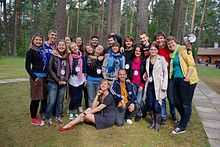
The Faculty offers three levels of degrees, bachelor studies, master’s studies and doctoral studies. Each is designed to produce specialists with skills such as:
- organizing and managing information within special information structures
- drafting, designing and implementing information policies, communication strategies, and campaigns for cultural, scientific, business, administration and media institutions, and
- conducting applied scientific research in communication and information domains.
The Faculty delivers full-time studies for all study programmes, and part-time studies for the Bachelor's degree programmes in library and information science and in journalism and for the Master’s degree programme in international communication. Modern learning techniques, such as integrated electronic (virtual) learning media, have been implemented since 2000. For the purpose of study quality, the study process involves professional practice in public, non-governmental, or business organizations in Lithuania and abroad.
Over 1200 students are enrolled. Among them, more than 1000 are taking the 4-year Bachelor's course and over 200 are studying for the Master’s degree. After successfully completing their studies, students are awarded the Bachelor's or Master’s Degree in Communication and Information. The number of study programmes has grown from 2 to 15 during the Faculty's 20 years. In 2008 and 2010, the Faculty conducted a self-examination of the study programmes.
In 1991, future librarians and journalists studied at the Faculty. Since that time that as grown to include archive science, cultural information and communication, informology, publishing, business information management, creativity communication, or journalism. The master’s degree in communication and information is awarded to students who have completed the master’s programmes in analytic journalism, sustainable development communication, communication sciences, publishing, heritage information and communication, public relations, international communication (conducted in English), information management and leadership or journalism.
The Faculty cooperates with 45 establishments from 17 countries. Its lecturers and students take part in ERASMUS/LLP academic exchange programmes and bilateral or multilateral academic collaboration programmes across the European Union.
Programmes based on the ERASMUS Project European Master’s Studies in Professional Communication adopted a competence learning system. Students engage in real-life situations provided by various international companies. Students choose in equal parts between compulsory and optional subjects. Courses are taught in English. Courses are offered for groups of 15-20 within the premises of partner Universities.
Student Organizations
Student Representation
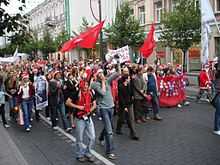
The Student Representation of the Faculty of Communication (SR FC) represents student interests and provides consultations on academic and social issues.
KomFakas.lt
Opened in 2005, KomFakas.lt serves as an informal website for the Faculty community. KomFakas.lt deals with issues of student life, interviews interesting people, hosts students’ creative projects and reviews books, movies or games. The website has a column about studies.[4]
Student Science Association
The Student Science Association (SSA) is an independent, voluntary, non-profit student organization. It involves scientists willing to share their experience and skills in scientific work. SSA organizes courses, public lectures, discussions and conferences, publishes an eBulletin and encourages student science initiatives. The Association engages in joint projects with other active student science associations of Vilnius University, and maintains contact with the social partners of the Faculty.[5][6]
The SSA aims:
- To encourage and develop student science activity, improve scientific skills and coordinate independent scientific projects;
- To develop critical thinking and organizational skills and encourage initiatives for science popularisation;
- To take part in scientific research endeavours;
- To present scientific papers at the traditional annual Student Science Conference;
- To organise SSA member meetings, student science paper competitions, scientific seminars, debates, and discussion clubs;
- To cooperate with other scientific organizations and student science associations in Lithuania and abroad;
- To take care of publication of scientific papers and engage in other lawful activities.[7]
References
- ↑ Vilniaus universiteto Komunikacijos fakultetas 1991-2006. Authors: L. Nevinskaitė; editor: Domas Kaunas; tekstų autoriai: Z. Atkočiūnienė, R. Matkevičienė ... [et.al.]. Vilnius: Alma littera, 2006. 44 p.;
- ↑ Vilnius university Faculty of Communication 2009-2013 year plan for strategic development. Authors: R. Laužikas, R. Matkevičienė, A. Navickienė, A. Vaišnys. Vilnius: Vilniaus universiteto Komunikacijos fakultetas, 2009. p.14;
- ↑ Vilniaus universiteto Komunikacijos fakultetas 1991-2006. author: L. Nevinskaitė; editor: D. Kaunas; text authors: Z. Atkočiūnienė, R. Matkevičienė ... [et.al.]. Vilnius: Alma littera, 2006. … [et al.]. Vilnius : Vaga, 1979. p. 30
- ↑ About KomFakas.lt, retrieved 2009-08-06
- ↑ "Mokslas taip, kaip visada, ir kitaip!".
- ↑ Student Science Association
- ↑ About SSA
External links
| ||||||||||||||||||||
